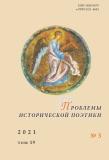Мотив греховной страсти и супружеской неверности в романах В. Набокова «Король, дама, валет» и «Камера обскура»
The Motif of Sinful Passion and Marital Infidelity in the Novels King, Queen, Knave and Camera Obscura by V. Nabokov
Author(s): Andriej KotinSubject(s): Christian Theology and Religion, Ethics / Practical Philosophy, Aesthetics, Russian Literature, Eastern Slavic Languages, Philology, Theory of Literature
Published by: Петрозаводский государственный университет
Keywords: Nabokov; sin; passion; patristic heritage; temptation; suffering; asceticism; marriage; religion; theology; aesthetics and ethics; love;
Summary/Abstract: The article examines the artistic depiction of vicious passion in Vladimir Nabokov’s Russian-language novels King, Queen, Knave and Camera Obscura. The purpose of this work is to describe the stylistic and narrative mechanisms used by Nabokov to examine the roots, development and final reign of the forbidden passion that enslaves a human soul. Contrary to the common stereotype of Nabokov as a predominantly “aesthetic” writer, the texts of his works reveal a profound moral dimension. Moreover, Nabokov’s approach to the concepts of sin and virtue, ethics and aesthetics often echoes, and sometimes completely coincides with the teachings of the founders of Christian theology and asceticism (Marcus Eremita, Peter of Damascus etc.). For example, the four-step description of the evolution of sinful passion into a destructive obsession finds unconditional embodiment in the texts analysed herein. On the other hand, marital love, based on kinship of souls and mutual fidelity, stays in clear contrast to an ordinary consumer lust. A happy and harmonious marriage, understood precisely in the spiritual and personal sense, overcomes social and everyday boundaries in Nabokov’s work, definitely breaking into a transcendent dimension. This fact is all the more curious because Nabokov was never a religious person and, judging by his own words, never displayed any interest in theological matters. Consequently, the common features that unite Nabokov’s morality and metaphysics with the foundations of the Christian worldview can be seen as rooted in the universal ethical laws of human life.
Journal: Проблемы исторической поэтики
- Issue Year: 19/2021
- Issue No: 3
- Page Range: 255-275
- Page Count: 21
- Language: Russian

